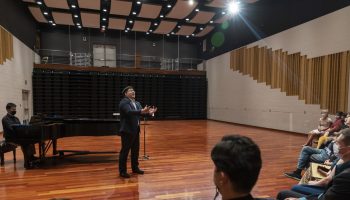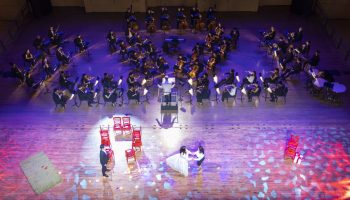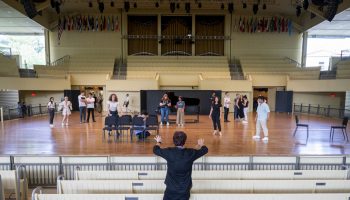Marlena Malas has been invited to teach voice master classes all over the world. She has taught in Tokyo, Brussels, Tel Aviv and Sydney, as well as Boston, San Francisco and Santa Fe. All this experience doesn’t make each new class any easier.
“I go through the same goddamn nerves all the time,” said Malas, the chair of Chautauqua Institution’s Voice Program. “What if I don’t have anything to say? What if I can’t help?”
At 1 p.m. Friday, she will bring her wealth of experience — nerves and all — to Fletcher Music Hall, where she will conduct yet another master class, this one with members of the Chautauqua Opera Company’s Young Artist Program.
The fact that she continues to be asked to teach master classes, along with her long-term faculty appointments at the Curtis Institute of Music (since 1986) and The Juilliard School (since 1989), seems to be a straightforward answer to those questions she asks herself. This isn’t lost on her.
“I talk to myself,” she said. “I say, ‘What? What is this? Get over it already.’ ”
So far, to no avail.
One part of Malas’ reticence comes from the fact that she isn’t completely comfortable with the term “master class.” To her, it creates a hierarchy that she would rather avoid.
“I’m definitely not a master. I’m just a person standing there having a dialogue with somebody,” she said. “It goes back and forth. It’s a two-way street.”
Two-way street or not, Malas won’t hesitate to jump into the driver’s seat if the situation demands it. In these instances, she can be persistent and unyielding, pursuing what she wants from a singer until she feels they deliver.
“I don’t think I’m ever cruel,” she said, “but if I get ahold of something and I know it’s right, I’m like a terrier. I go until I get it.”
Another part of Malas’ nerves comes from the fact that, in each master class, she is working with brand new students, students whom she doesn’t know. Often times those students have spent years working with vocal coaches.
“I don’t want to disturb that,” she said. “Maybe I can plant seeds and make them think about something in a different way. Not necessarily change anything, but maybe enhance what they already have.”
In the Young Artists, Malas will find herself working with students who are a bit older than the Voice Program students with whom she has worked this summer. This difference in age doesn’t change her approach. While the Young Artists may know a bit more and have a bit more experience, Malas is conscientious about working with who, and what, is in front of her.
This approach itself can create a third reason for nerves.
“I never know what to expect,” she said.
For someone who has been singing since she was a little girl (her mother passed away when she was 5, so she started spending time with her father, eventually singing pub songs in the bar and grill he owned), what she doesn’t yet know still sometimes catches her off guard.
“I really do learn every day from these kids,” Malas said. “Sometimes I think, ‘Oh, you’ve heard everything,’ and then somebody comes in (to sing) and I say, ‘Nope, you haven’t heard a thing.’ ”




